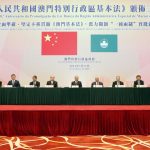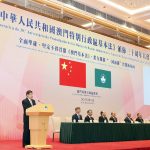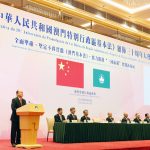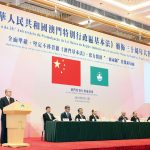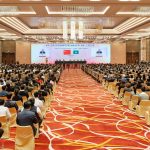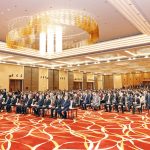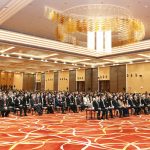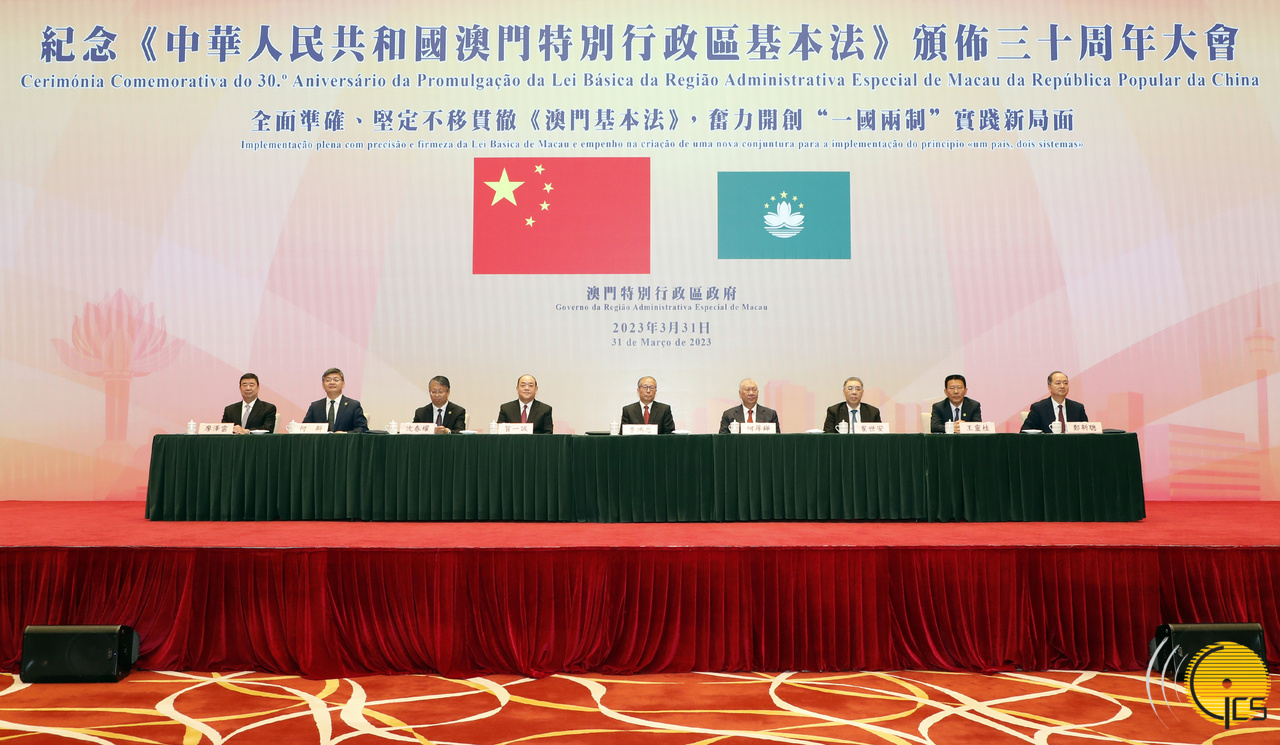 Member of the Political Bureau of the Communist Party of China Central Committee, and Vice Chairman of the Standing Committee of the National People's Congress, Mr Li Hongzhong, and the Chief Executive, Mr Ho Iat Seng, attends a ceremony held in Macao to commemorate the 30th anniversary of the promulgation of the Basic Law of the Macao Special Administrative Region of the People's Republic of China.
Member of the Political Bureau of the Communist Party of China Central Committee, and Vice Chairman of the Standing Committee of the National People's Congress, Mr Li Hongzhong, and the Chief Executive, Mr Ho Iat Seng, attends a ceremony held in Macao to commemorate the 30th anniversary of the promulgation of the Basic Law of the Macao Special Administrative Region of the People's Republic of China.
The Government of the Macao Special Administrative Region (MSAR) today held a ceremony to commemorate the 30th anniversary of the promulgation of the Basic Law of the MSAR of the People’s Republic of China.
At today’s ceremony, held at the China-Portuguese-speaking Countries Commercial and Trade Service Platform Complex, in Macao, member of the Political Bureau of the Communist Party of China (CPC) Central Committee and Vice Chairman of the Standing Committee of the National People's Congress (NPC), Mr Li Hongzhong, gave a keynote speech.
Also delivering a speech at the ceremony were the Chief Executive, Mr Ho Iat Seng; and member of the former Macao Basic Law Drafting Committee and chairman of a MSAR Basic Law promotion association, Mr Liu Chak Wan.
The ceremony had as theme “Fully, accurately, and unswervingly implement the Basic Law of the MSAR, and strive for a new chapter in the implementation of the ‘One country, two systems’ principle”.
Mr Li said in his speech that over the 30 years since its promulgation – especially since its implementation on 20 December 1999 – the MSAR Basic Law, in conjunction with the country’s Constitution, had been the foundation of the MSAR. The MSAR Basic Law had established the constitutional order for the MSAR, and provided all-round protection for every aspect of development within the MSAR.
The 20th CPC National Congress report had affirmed the remarkable achievements made over the years under the practice of the “One country, two systems” principle, and the astonishing results regarding the work done in relation to Hong Kong and Macao. Its report had outlined a new concept and new requirements for optimisation of the “One country, two systems” principle.
Mr Li called on the Macao public firmly to follow the 20th CPC National Congress report as a guide for action in work relating to Hong Kong and Macao. In the new era and new journey, the implementation of the MSAR Basic Law was of great significance for opening a new chapter in the practice of “One country, two systems”, he said.
During today’s ceremony, Mr Li shared thoughts on six aspirations. The first was the need comprehensively and accurately to understand the connotation and essence of the “One country, two systems” principle, and the relationship between the “one country” and the “two systems”. Organs of the MSAR Government, as well as residents and social organisations in Macao should consciously respect and safeguard the fundamental system of the country.
The second aspiration on which Mr Li shared his thoughts was the need to understand thoroughly the constitutional order laid down jointly under the country’s Constitution and the MSAR Basic Law. In the governance of the MSAR, the Constitution and the MSAR Basic Law are indispensable and inseparable: they jointly play a fundamental role in safeguarding the rule of law.
The third aspiration mentioned by Mr Li was the need earnestly to safeguard the country’s sovereignty, security, and development interests. It was hoped that the MSAR Government would enhance further its awareness of national security, strictly enforce rule of law, and ensure the effective implementation of all relevant laws and regulations. It was also hoped the Macao community would give their full support to the MSAR Government to enable it to fulfil its responsibilities and abide by the law.
The fourth aspiration mentioned by Mr Li was the need to continue optimising the mechanism relating to “One country, two systems”, and firmly to uphold the overall jurisdiction of the central authorities.
The fifth aspiration on which Mr Li shared his thoughts was the need to adhere to the “patriots governing Macao” principle. Only with patriots in power can, respectively: the “One country, two systems” principle be fully and accurately implemented; the overall governance by the central authorities be effectively safeguarded; the constitutional order established by the Constitution and the MSAR Basic Law be effectively maintained; and can deep-rooted issues be resolved.
The sixth aspiration raised by Mr Li was the need to step up effort to integrate further Macao into overall national development. Macao should take the initiative to align with the country’s major development strategies, in particular the development of the Guangdong-Macao Intensive Cooperation Zone in Hengqin.
Mr Li acknowledged the remarkable results achieved by the Macao community in publicising and promoting the Constitution and the MSAR Basic Law. It was hoped this fine tradition would be carried forward by the next generation, he said.
Speaking during the ceremony, Chief Executive Mr Ho said Mr Li’s presence in Macao for the commemorations of the 30th anniversary of the promulgation of the MSAR Basic Law illustrated the central authorities’ determination fully, accurately, and unswervingly to implement the “One country, two systems” principle; and their care for, and support of, the MSAR and the people in Macao.
Reviewing the 20 years over which Macao had firmly adhered to the MSAR Basic Law and fully and successfully implemented the “One country, two systems” principle, Mr Ho shared three points of understanding, taking as the context Macao’s actual situation.
The first point of understanding raised by Mr Ho was that practise had proven that the “One country, two systems” principle had fulfilled the fundamental interests of the country and of Macao, and shown that it is the best and most systematic arrangement for ensuring the long-term stability and prosperity of the MSAR.
Since its establishment, the MSAR had been resolutely safeguarding the country’s sovereignty, security, and development interests, Mr Ho said. The MSAR had also exercised a high degree of autonomy as enshrined by the MSAR Basic Law, and had kept optimising the content of the “One country, two systems” principle. Meanwhile, the MSAR had seen rapid development, with a focus on appropriate economic diversification. Fundamental rights enjoyed by Macao residents, and their welfare and well-being, were securely protected. There had been progress in various undertakings relating to the community. Macao had strengthened its effort regarding regional cooperation, and enhanced its role in relation to external exchange and cooperation.
The second point of understanding mentioned by Mr Ho was that the MSAR Government had always firmly upheld the constitutional order established by the Constitution and the MSAR Basic Law. There had been continued effort to share with the public information on the two legal frameworks, with an aim of strengthening the patriotic foundation of the community.
The MSAR Government firmly adhered to the rule of law, the principle of “patriots governing Macao”, and the need for promotion of awareness in the community of the Constitution and the MSAR Basic Law.
The third point of understanding outlined by the Chief Executive was President Xi Jinping's important statements on “One country, two systems", together with the report of the 20th CPC National Congress, were the basis for the implementation of the “One country, two systems” principle in the new era.
In that regard, there should be determined effort to: safeguard the central authorities’ overall jurisdiction of the country; fulfil Macao’s constitutional duties to safeguard national security; press ahead with Macao’s appropriate economic diversification and the city’s high-quality development; consolidate the basis for steady implementation of the “One country, two systems” principle; adhere to an executive-led system and the rule of law; enhance people’s well-being; resolve deep-rooted issues; adhere to the principle of “patriots governing Macao”; and give further play to Macao’s advantages in order to integrate the city better into overall national development.
In his speech, Mr Liu shared details regarding the drafting of the MSAR Basic Law and the work involved in consulting the public when drafting the document.
Mr Liu said the MSAR Basic Law had been a result of soliciting opinions from various sectors in the community, and fully conformed to the actual situation and development needs of Macao’s economy and society. The MSAR Basic Law embodied certain principles and details, and had supported the sound governance practised by the MSAR Government since Macao’s return to the motherland. The MSAR Basic Law had been formulated in a highly-prudent manner, covering major issues related to the long-term stability of Macao.
Mr Liu noted that the MSAR had a well-established and well-coordinated system to promote, within the community, the Constitution and the MSAR Basic Law, thus developing in Macao society an ever-deeper understanding of the two elements.
Other officiating guests at today’s ceremony were: Vice Chairman of the National Committee of the Chinese People's Political Consultative Conference (CPPCC), Mr Ho Hau Wah; Mr Chui Sai On; Director of the Legislative Affairs Commission of the NPC Standing Committee and Chairman of the Hong Kong and Macao Basic Law Committee, Mr Shen Chunyao; and Deputy Director of the Hong Kong and Macao Affairs Office of the State Council, Mr Wang Linggui.
Among the approximately 1,000 guests attending the ceremony, were also senior officials involved in Macao’s return to the motherland; senior members of the former Macao Basic Law Drafting Committee; principal officials of the MSAR Government; leaders of the offices of the Central Government in the MSAR; representatives of relevant departments of the Central Government; representatives of the Guangdong Government; and Macao deputies to the NPC and to the CPPCC.


